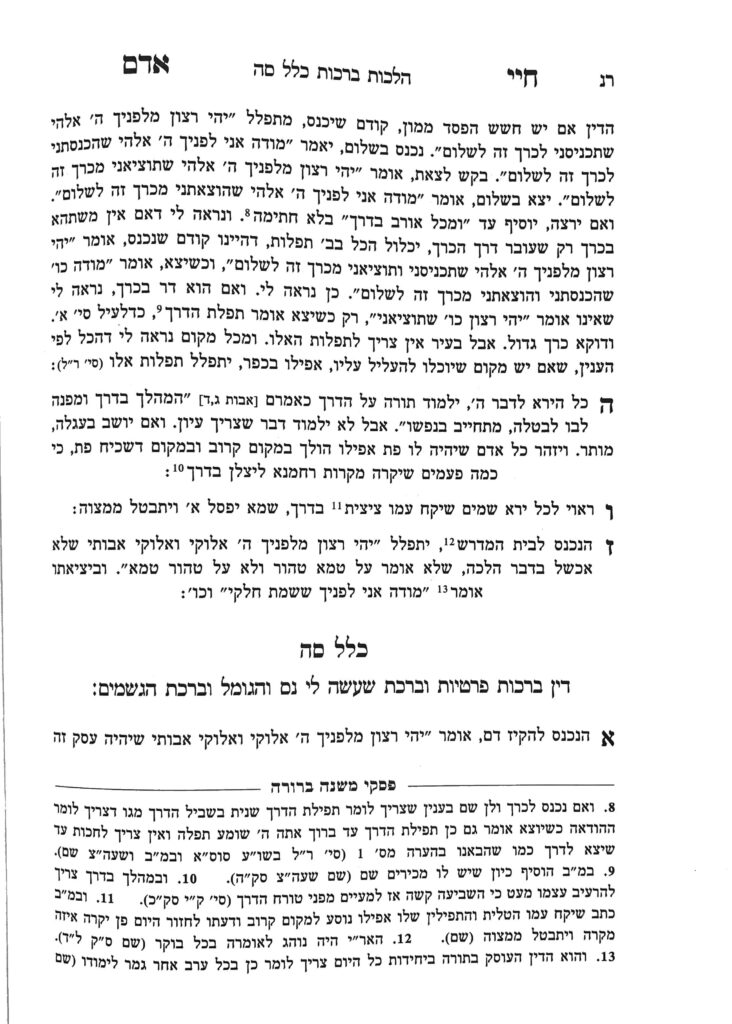We are beginning siman 7. The Chayei Adam discusses the tefilla known as tefillas Rav Nechunya Ben Hakanah; tefillos Rav Nechunya would recite before learning.
The Chayei Adam writes that when one enters the beis medrash, they should recite the following tefillah: יהי רצון מלפניך ה’ או”א שלא אכשל בדבר הלכה שלא אומר על טמא טהור ולא על טהור טמא.
When one leaves the beis medrash, one recites מודה אני לפניך ששמתי חלקי וכו
The Mishnah Berurah points out that these tefillos are equally pertinent when learning at home.
The source for these tefillos is the Gemara in Brachos 28b. The Mishnah relates that Rav Nechunya would recite a tefillah before learning, so that he should not make mistakes in his learning, and a tefillah afterwards, to thank Hashem for the opportunity to learn.
The Gemara relates the full nusach of the tefillos: יְהִי רָצוֹן מִלְּפָנֶיךָ ה׳ אֱלֹהַי שֶׁלֹּא יֶאֱרַע דְּבַר תַּקָּלָה עַל יָדִי, וְלֹא אֶכָּשֵׁל בְּדָבָר הֲלָכָה, וְיִשְׂמְחוּ בִּי חֲבֵרַי, וְלֹא אוֹמַר עַל טָמֵא טָהוֹר, וְלֹא עַל טָהוֹר טָמֵא. וְלֹא יִכָּשְׁלוּ חֲבֵרַי בִּדְבַר הֲלָכָה, וְאֶשְׂמַח בָּהֶם
מוֹדֶה אֲנִי לְפָנֶיךָ ה׳ אֱלֹהַי שֶׁשַּׂמְתָּ חֶלְקִי מִיּוֹשְׁבֵי בֵּית הַמִּדְרָשׁ וְלֹא שַׂמְתָּ חֶלְקִי מִיּוֹשְׁבֵי קְרָנוֹת. שֶׁאֲנִי מַשְׁכִּים, וְהֵם מַשְׁכִּימִים. אֲנִי מַשְׁכִּים לְדִבְרֵי תוֹרָה, וְהֵם מַשְׁכִּימִים לִדְבָרִים בְּטֵלִים. אֲנִי עָמֵל וְהֵם עֲמֵלִים. אֲנִי עָמֵל וּמְקַבֵּל שָׂכָר, וְהֵם עֲמֵלִים וְאֵינָם מְקַבְּלִים שָׂכָר. אֲנִי רָץ וְהֵם רָצִים. אֲנִי רָץ לְחַיֵּי הָעוֹלָם הַבָּא וְהֵם רָצִים לִבְאֵר שַׁחַת
The Mishnah does not relate this as a chiyuv, but the Rambam, in Peirush Hamishnayos, writes that it is a chovah (obligation) to recite them. The shulchan Aruch in Siman 110 follows the rambam, and states that one is required to say these tefillos.
The Mishnah Berurah, in Siman 110:5, adds an additional tefillah: יהי רצון ה’ או”א שתאיר עיני במאור תורתך והצילנו מכל מכשול וטעות הן בדיני איסור והיתר הן בדיני ממונות הן בהוראה הן בלימוד גל עיני ואביטה נפלאות מתורתך ומה ששגיתי כבר העמידני על האמת ואל תצל מפי דבר אמת עד מאוד כי ד’ יתן חכמה מפיו דעת ותבונה
The Maharal asks why these tefillos specifically accentuate not making a mistake in halacha and others being happy with a person. He explains that Chazal were concerned that if a person makes a mistake in their learning, others will say the opposite, as is the nature when learning. Although, by others arguing the opposite, the group may end up with the correct halacha, those who were correct may gloat over the mistake made by the first person. If they gloat, they will be punished in shamayim. Thus, in addition to the first person making a mistake in learning, the others are punished. Therefore, we daven that we should not make a mistake and that our chavrusos should be happy with us, to avoid others being punished in shamayim.
The Maharal adds that the reason we are known for being so contentious is in order to be marbeh torah-in order to better clarify and sharpen our torah learning. The give and take of discussion forces us to hone in on a precise version of the Torah concept. If we were agreeable, we would not come to that level of clarification.
Summary
- The Rambam understands that one is obligated to recite a tefillah before learning, to ask Hashem to help them come to the correct halacha, and a tefillah afterwards, to thank Hashem for the zechus to learn.



